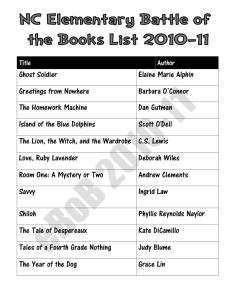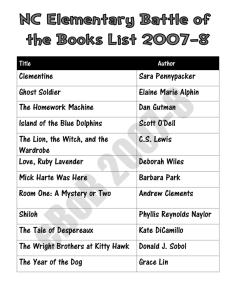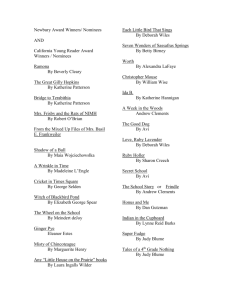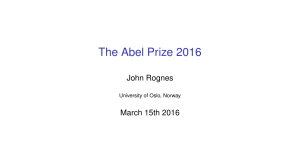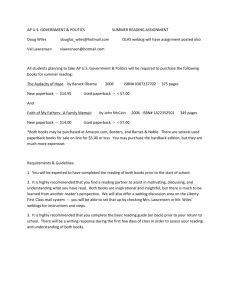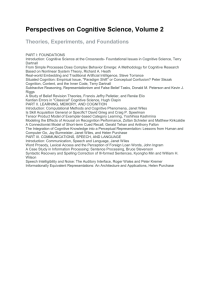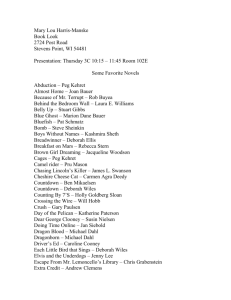Professor Peter Wiles
advertisement
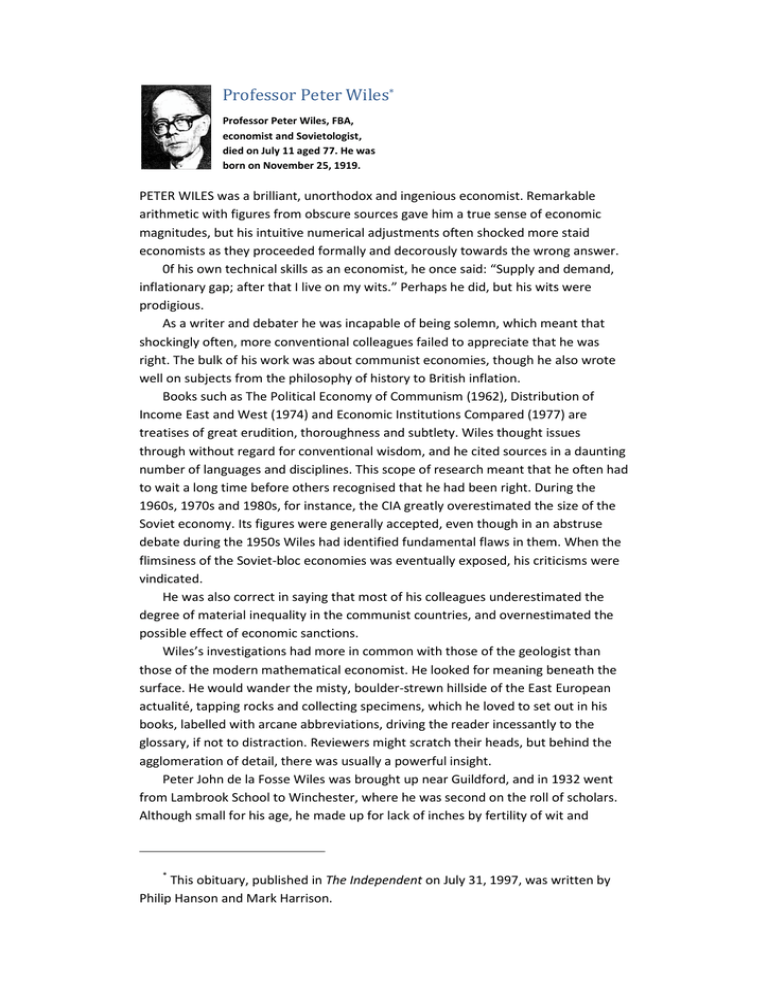
Professor Peter Wiles* Professor Peter Wiles, FBA, economist and Sovietologist, died on July 11 aged 77. He was born on November 25, 1919. PETER WILES was a brilliant, brilli unorthodox and ingenious nious economist. Remarkable arithmetic with figures from obscure sources gave him a true sense of economic magnitudes, tudes, but his intuitive numerical nu adjustments often shocked hocked more staid economists mists as they proceeded formally for and decorously towards the wrong answer. 0f his own technical skills as an economist, he once said: “Supply Supply and demand, inflationary tionary gap; after that I live on my wits.” Perhaps he did, but his wits were prodigious. As a writer and debater he was incapable of being solemn, emn, which meant that shockingly ingly often, more conventional colleagues failed to appreciate thatt he was right. The bulk of his work was about communist communist economies, though he also wrote well on subjects from the philosophy of history to British inflation. Books such as The Political Politica Economy of Communism (1962), 62), Distributi Distribution of Income East and West (1 1974) and Economic Institutions Compared pared (1977) are treatises of great erudition, thoroughness and subtlety. Wiles thought issues through without regard for conventional wisdom, and he cited sources in a d daunting number of languages and disciplines. This scope of research search meant that he often had to wait a long time before others recognised that he had been right. ht. During the 1960s, 1970s and 1980s,, for instance, the CIA greatly overestimated the size of the Soviet economy. Its ts figures were wer generally accepted, even though in an abstruse debate during the 1950s Wiles had identified fundamental flaws in them. When the flimsiness of the Soviet-bloc bloc economies was eventually exposed, his criti criticisms were vindicated. He was also correct in saying say that most of his colleagues underestimated the degree of material inequality in the communist countries, and overnestimated estimated tthe possible effect of economic sanctions. Wiles’ss investigations had more in common with those of the geologist gist than those of the modern mathematical economist. He looked for meaning beneath the surface. He would wander the misty, misty boulder-strewn hillside of the East European actualité, tapping rocks and collecting specimens, spe which he loved to set out in his books, labelled with arcane abbreviations, driving the reader incessantly to the glossary, if not to distraction. Reviewers might scratch their heads, but behind the agglomeration eration of detail, there was usually a powerful insight. Peter John de la Fosse Wiles was brought up near Guildford, and in 1932 went from Lambrook rook School to Winchester, where he was second ond on the roll of scholars. Although small forr his age, he made up for lack of inches by fertility of wit and * This obituary, published in The Independent on July 31, 1997, was written by Philip Hanson and Mark Harrison. 2 ferocity of style. In 1937 he was elected senior scholar of New College, Oxford, overcoming the Latinist who had beaten him just five years before. The Second World War broke out at the end of his first year at Oxford, and he served five years as an officer in the Royal Artillery, becoming a specialist in the interception of enemy wireless traffic. He was in charge of the 8th Army’s listening unit in the Western Desert, which was so effective that Montgomery’s chief of intelligence, Bill Williams, boasted that the Ultra secret intelligence he received usually only confirmed what he already knew. Never one to suffer fools gladly, Wiles was dismissed from the 8th Army for impertinence shortly after the second Battle of Alamein. He returned to Woolwich, on the way solving at a glance a cipher conundrum that had baffled colleagues in AIgiers. Some use was made of his extraordinary gifts at Bletchley Park in the closing months of the war. He then returned to Oxford to read Modern Greats. At the suggestion of one of his tutors, he applied for and won an All Souls fellowship in 1947. Advised by the Warden of All Souls not to place temptation in the examiners’ way, he never took his schools. After a year in that most unblemished of ivory towers, he returned to New College as a Fellow, and taught economics for 12 years. The brain-drain then took him to America, and he spent the first four years of the 1960s at Brandeis University. After spells in Stockholm, at Columbia and at the City College of New York, he became Professor of Russian Social and Economic Studies at the University of London from 1965 to 1985. He was elected a Fellow of the British Academy in 1990. A lifelong Liberal, he spurned economic dogma, and his economic thinking was humane to the core. He was passionate about economic efficiency, but saw markets as merely means to satisfy human wants. In his last years he saw the triumph of the market in Eastern Europe and much of the old Soviet Union, but he was angered by the extent to which the poor were being sacrificed to the new economic system – what he called “capitalist triumphalism”. Unlike some abstract reasoners, Peter Wiles was acute, perceptive and rather soft-hearted about people – though naturally in an unconventional way. He had, for example, a most effective way of breaking the ice when introduced to the wives of colleagues. He would open the conversation by saying of the more or less innocent husband in question: “He is an absolute bastard, isn’t he?” At the end of the war, Peter Wiles married a childhood friend, Elizabeth Coppin. They had a son and two daughters, but the marriage was dissolved in 1960, and he married Carolyn Stedman of New York, who looked after him during his protracted final illness and survives him, as do his children.
